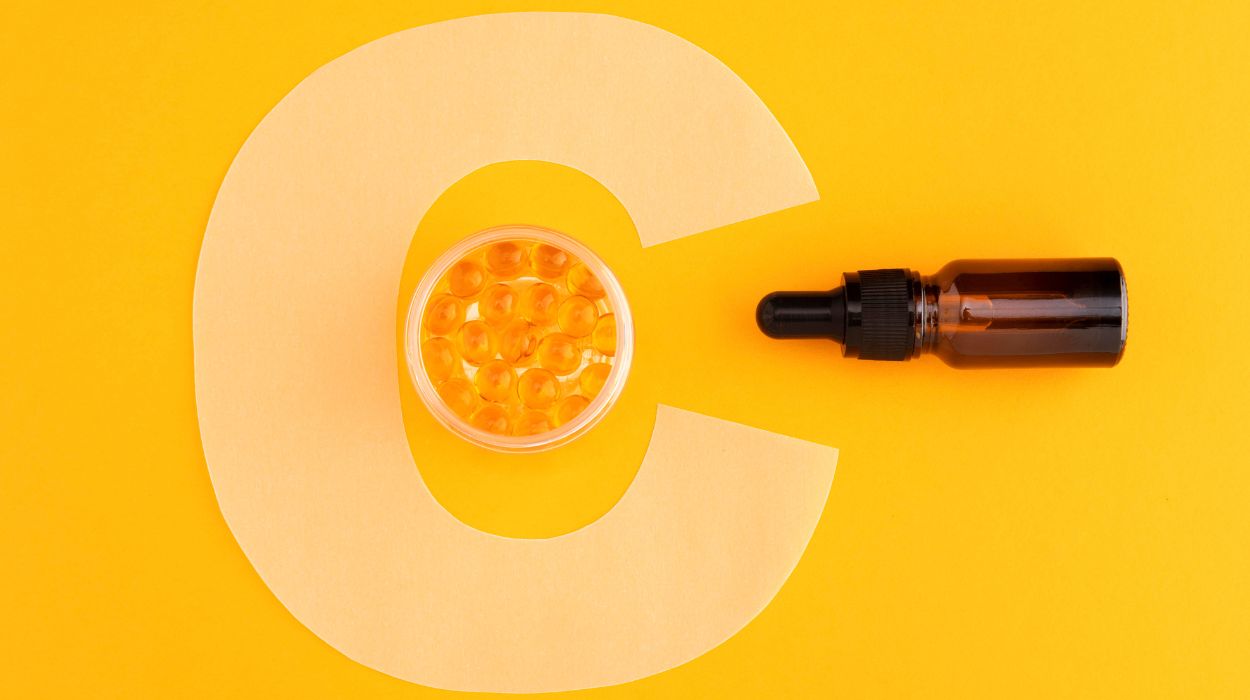 Expert's opinion
Expert's opinion
Expert's opinion
The article is a subjective view on this topic written by writers specializing in medical writing.
It may reflect on a personal journey surrounding struggles with an illness or medical condition, involve product comparisons, diet considerations, or other health-related opinions.
Although the view is entirely that of the writer, it is based on academic experiences and scientific research they have conducted; it is fact-checked by a team of degreed medical experts, and validated by sources attached to the article.
The numbers in parenthesis (1,2,3) will take you to clickable links to related scientific papers.
Best Time To Take Vitamin C: Morning Or Night In 2024?

Vitamin C deficiency, also known as scurvy, can lead to a range of health issues, including fatigue, weakened immunity, and impaired wound healing. To mitigate the risk of deficiency and promote optimal health, it’s essential to ensure adequate intake of vitamin C through diet or supplementation.
Vitamin C supplements are one of the most well-known and loved vitamin supplements and with good reason. It is an essential nutrient with many amazing functions.
Many different forms of water-soluble vitamin C are available, from ascorbic acid to mineral ascorbate. One of the primary debates is not what kind to take but when is the best time to take vitamin C and in what dose. So, let’s find out!
When Is The Best Time To Take Vitamin C?
There is no best time to take vitamin C, it can be taken any time of the day. Some may prefer to take it with food earlier in the day to help prevent heartburn.
The most important consideration when taking vitamin C is the dose. Very high doses may cause gastrointestinal distress or will not be well absorbed. It is better to divide the dose throughout the day if you need to take an amount higher than 1000 milligrams.
The Best Time Of The Day To Take Vitamin C
So is the best time to take vitamin C morning or night? While there is often the best time to take vitamins, you can take vitamin C supplements anytime, though it may be better tolerated in the mornings and not on an empty stomach.
Vitamin C should be taken in divided doses when supplementing with more than 1,000 milligrams daily, or the absorption could drop by fifty percent.[1] Taking 500 milligrams morning and night, or morning, noon, and night, might be recommended, but it is best to check with your healthcare provider. Everyone is different!
Can I Take Vitamin C At Night?
Yes, vitamin C can be taken at night, but a dose of 1,000 milligrams is better divided throughout the day rather than taken all at once, risking incomplete absorption. Be aware that vitamin C is acidic and may cause reflux, especially if lying down immediately after taking it.
Why We Should Take Vitamin C

Vitamin C, also called ascorbic acid, is water soluble and therefore is not stored in the body like fat soluble vitamins. It needs to be replenished for optimal health benefits.
Vitamin C supports the immune system, helps us absorb iron, promotes healthy skin and hair, assists with wound healing, reduces inflammation, and may even help to prevent certain types of cancer.
Immune System Support
Vitamin C is one essential micronutrient that helps support a healthy immune system.[2] It does this by supporting various cellular functions of the immune system, such as phagocytosis, during which white blood cells destroy viruses, production of antibodies allowing your immune system to recognize and attack pathogens, and flagging antigens so your immune system can recognize them as a threat.
Vitamin C has also been shown to have antioxidant properties that help protect the body from oxidative stress caused by harmful free radicals. This helps reduce the inflammation that leads to infection and illness.
Since vitamin C and zinc improve the immune system, immune-stimulating supplements are often formulated with them.
Improved Iron Absorption
Vitamin C improves iron absorption[3] by increasing the amount of non-heme iron absorbed, but only when ingested with iron. Vitamin C increases the solubility of non-heme iron, allowing it to move through mucosal cells more easily.
Vitamin C also reduces the number of dietary components that can inhibit iron absorption,[4] such as phytates, oxalates, and calcium, and can help reduce oxidative stress in the body, leading to improved bioavailability of both heme and non-heme sources of iron.
Healthy Skin And Hair
Vitamin C can help promote skin health and hair health. It helps to protect the cells in the skin and hair from damage caused by environmental pollutants while stimulating collagen production, which gives skin its elasticity and helps keep hair strong and healthy.
Vitamin C has been shown to reduce inflammation, dark spots, wrinkles, and discoloration, as well as helping to repair damaged hair follicles. As vitamin C is an antioxidant, it helps combat oxidative stress caused by environmental factors such as UV rays, smoke, and pollution.[5] This makes it an important part of any skincare routine or diet for those looking to maintain healthy skin and hair.
Improved Wound Healing
Vitamin C can promote wound healing due to its involvement in collagen biosynthesis.[6] Collagen is a major structural protein that forms the scaffolding for tissue repair, and vitamin C helps convert collagen precursors into mature fibers.
Vitamin C has also been shown to increase blood flow to wound sites to promote faster and more successful healing.[7]
Anti-Inflammatory
Vitamin C is a well-documented anti-inflammatory nutrient.[8] Studies show it reduces inflammation by decreasing the production of pro-inflammatory cytokines[9] and chemokines.[10]
Anti-Cancer
Vitamin C has been studied for its potential anti-cancer properties.[11]
Vitamin C also increases the activity of enzymes[12] that inhibit cancer growth. It helps to detoxify carcinogenic compounds in the body and can help destroy tumor cells while leaving healthy cells alone. Pending further research, it possibly could play a significant role in preventing and fighting cancer, particularly at high intravenous doses.
Hormone Synthesis And Energy Production
Vitamin C helps make several hormones and chemical messengers[1] in the brain and nerves. This includes the hormones epinephrine, norepinephrine, and serotonin. It also helps to produce carnitine,[13] which is essential in energy metabolism.
Carnitine transports long-chain fatty acids across cell membranes into the cell’s mitochondria, which are used for energy production. Vitamin C plays a vital role in cholesterol metabolism[14] as well. It helps convert cholesterol into bile acids, essential for the proper digestion and absorption of fats.
How Much Vitamin C Should You Have Every Day?
For daily ingestion of vitamin C-rich foods, enough vitamin C is 90 milligrams for adult males and 75 milligrams for adult females, according to the dietary reference intakes. When vitamin C is prescribed as a supplement or as a treatment for a health condition, it will be in doses of over 400 milligrams.
Dietary supplements up to 2,000 milligrams per day are considered the safe upper limit; more may cause GI distress.
Intravenous vitamin C can provide higher amounts as it bypasses the gastrointestinal system. Therefore, intravenous administration can be used therapeutically for conditions such as cancer, infections, or health issues requiring a high-dose vitamin supplement.
Precautions & Safety Tips

It is important to note that while vitamin C is water soluble and considered safe, high-dose supplements can cause severe gastrointestinal upset. Therefore, it is advisable to consult with a doctor before taking large quantities of this or any other vitamins.
Adverse effects[15] have been reported with intravenous vitamin C of headaches, nausea, dizziness, diarrhea, flushing, and even psychiatric effects on mood.[16]
Significant amounts of vitamin C may increase the likelihood of kidney stones and elevate uric acid, as it acidifies the urine.
Vitamin C supplementation may be contraindicated in some blood disorders such as thalassemia, sickle cell, and hemochromatosis.
People with diabetes should talk to their healthcare provider before taking vitamin C supplements, as they may raise blood sugar levels.
Conclusion
Vitamin C is a great nutrient at any time of the day, with or without food, provided it doesn’t upset your stomach. Doses of 1000 milligrams per day should be divided to ensure maximum absorption and significantly high doses of vitamin C should only be administered intravenously.
+ 16 sources
Health Canal avoids using tertiary references. We have strict sourcing guidelines and rely on peer-reviewed studies, academic researches from medical associations and institutions. To ensure the accuracy of articles in Health Canal, you can read more about the editorial process here
- Doseděl, M., Eduard Jirkovský, Kateřina Macáková, Lenka Kujovská Krčmová, Lenka Javorská, Pourová, J., Mercolini, L., Remião, F., Nováková, L. and Přemysl Mladěnka (2021). Vitamin C—Sources, Physiological Role, Kinetics, Deficiency, Use, Toxicity, and Determination. Nutrients, [online] 13(2), pp.615–615. doi:https://doi.org/10.3390/nu13020615.
- Carr, A.C. and Maggini, S. (2017). Vitamin C and Immune Function. Nutrients, [online] 9(11), pp.1211–1211. doi:https://doi.org/10.3390/nu9111211.
- Elif Piskin, Cianciosi, D., Sukru Gulec, Tomas, M. and Esra Capanoglu (2022). Iron Absorption: Factors, Limitations, and Improvement Methods. ACS omega, [online] 7(24), pp.20441–20456. doi:https://doi.org/10.1021/acsomega.2c01833.
- M. López-Moreno, Garcés-Rimón, M. and Maria Graça Miguel (2022). Antinutrients: Lectins, goitrogens, phytates and oxalates, friends or foe? Journal of Functional Foods, [online] 89, pp.104938–104938. doi:https://doi.org/10.1016/j.jff.2022.104938.
- Milani, M., Bita Hashtroody, Piacentini, M. and Celleno, L. (2019). Skin protective effects of an antipollution, antioxidant serum containing Deschampsia antartica extract, ferulic acid and vitamin C: a controlled single-blind, prospective trial in women living in urbanized, high air pollution area. Clinical, Cosmetic and Investigational Dermatology, [online] Volume 12, pp.393–399. doi:https://doi.org/10.2147/ccid.s204905.
- DePhillipo, N.N., Aman, Z.M., Kennedy, M.I., Begley, J.P., Moatshe, G. and LaPrade, R.F. (2018). Efficacy of Vitamin C Supplementation on Collagen Synthesis and Oxidative Stress After Musculoskeletal Injuries: A Systematic Review. Orthopaedic Journal of Sports Medicine, [online] 6(10), p.232596711880454-232596711880454. doi:https://doi.org/10.1177/2325967118804544.
- Bechara, N., Flood, V.M. and Gunton, J.E. (2022). A Systematic Review on the Role of Vitamin C in Tissue Healing. Antioxidants, [online] 11(8), pp.1605–1605. doi:https://doi.org/10.3390/antiox11081605.
- Elżbieta Skrzydlewska and Elżbieta Skrzydlewska (2022). Antioxidative and Anti-Inflammatory Activity of Ascorbic Acid. Antioxidants, [online] 11(10), pp.1993–1993. doi:https://doi.org/10.3390/antiox11101993.
- Kany, S., Jan Tilmann Vollrath and Borna Relja (2019). Cytokines in Inflammatory Disease. International Journal of Molecular Sciences, [online] 20(23), pp.6008–6008. doi:https://doi.org/10.3390/ijms20236008.
- Capucetti, A., Albano, F. and Raffaella Bonecchi (2020). Multiple Roles for Chemokines in Neutrophil Biology. Frontiers in Immunology, [online] 11. doi:https://doi.org/10.3389/fimmu.2020.01259.
- Mussa, A., Ros, Ahmed, N., Ahmad, S., Ahmad Hafiz Murtadha, Damitri, A., Chan Yean Yean, Aizan, W., Norhafiza Mat Lazim, Vuk Uskoković, Khalid Hajissa, Noor Fatmawati Mokhtar, Mohamud, R. and Hassan, R. (2022). High-Dose Vitamin C for Cancer Therapy. Pharmaceuticals, [online] 15(6), pp.711–711. doi:https://doi.org/10.3390/ph15060711.
- Franziska Böttger, Vallés-Martí, A., Cahn, L. and Jimenez, C.R. (2021). High-dose intravenous vitamin C, a promising multi-targeting agent in the treatment of cancer. Journal of Experimental & Clinical Cancer Research, [online] 40(1). doi:https://doi.org/10.1186/s13046-021-02134-y.
- Nasir Talenezhad, Mohammad Reza Mohammadi, Nahid Ramezani-Jolfaie, Mozaffari-Khosravi, H. and Kwon, D.-S. (2020). Effects of l-carnitine supplementation on weight loss and body composition: A systematic review and meta-analysis of 37 randomized controlled clinical trials with dose-response analysis. Clinical nutrition ESPEN, [online] 37, pp.9–23. doi:https://doi.org/10.1016/j.clnesp.2020.03.008.
- Dludla, P.V., Nkambule, B.B., Nyambuya, T.M., Khanyisani Ziqubu, Mabhida, S.E., Vuyolwethu Mxinwa, Kabelo Mokgalaboni, Fransina Ndevahoma, Hanser, S., Mazibuko-Mbeje, S.E., Albertus Kotze Basson, Jacopo Sabbatinelli and Tiano, L. (2022). Vitamin C intake potentially lowers total cholesterol to improve endothelial function in diabetic patients at increased risk of cardiovascular disease: A systematic review of randomized controlled trials. Frontiers in Nutrition, [online] 9. doi:https://doi.org/10.3389/fnut.2022.1011002.
- Zasowska-Nowak, A., Nowak, P. and Aleksandra Ciałkowska-Rysz (2021). High-Dose Vitamin C in Advanced-Stage Cancer Patients. Nutrients, [online] 13(3), pp.735–735. doi:https://doi.org/10.3390/nu13030735.
- Plevin, D. and Galletly, C. (2020). The neuropsychiatric effects of vitamin C deficiency: a systematic review. BMC Psychiatry, [online] 20(1). doi:https://doi.org/10.1186/s12888-020-02730-w.



